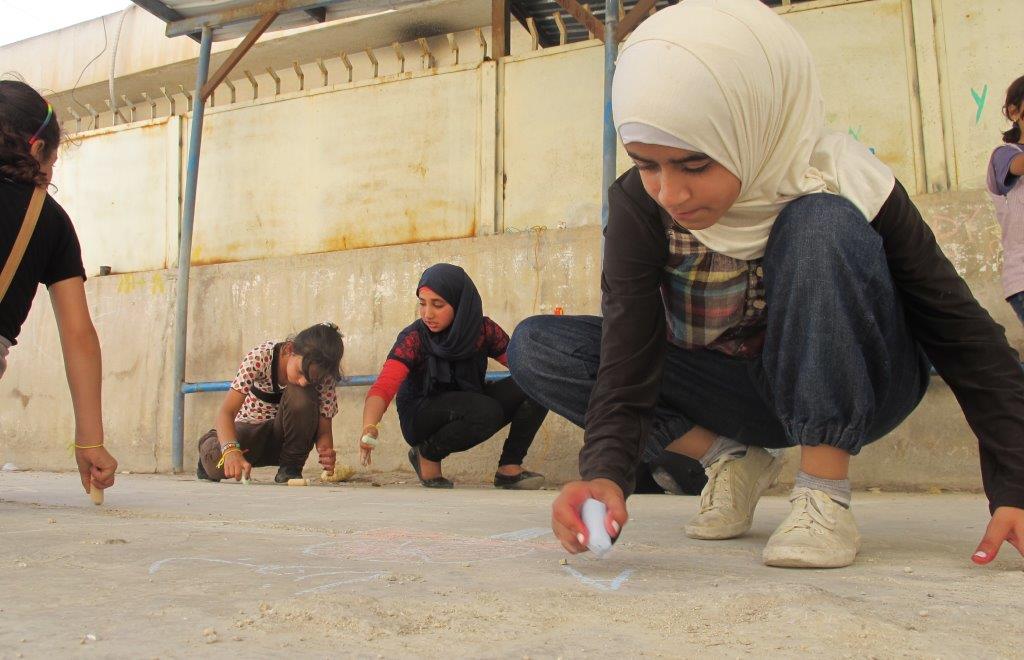Fulbright-Hayes Trip: Teachers Learn Human Security in Jordan
By Susan Wiedel and Elaine Linn
 |
| Palestinian Refugees |
The question of human security is always present in the minds of travelers to Jordan, as every friend or family member asks before departure, “Is it going to be safe?” Surrounded by countries in the midst of war, plagued with little access to water, and the displacement of people as a result of war or occupation, the question is a reasonable one. This past June, Elaine Linn, Assistant Director for the Global Studies Center, led a four-week Fulbright-Hays Seminar in Jordan. Twelve teachers from Pennsylvania, Minnesota, Ohio, and Massachusetts traveled to Jordan to study the Arabic language, culture, citizenship, and nationalism. The end goal was for teachers to create curriculum and to teach more effectively about the Arab world. Working with Princes Sumaya University in Amman, teachers took 33 hours of language instruction and 95 hours of area studies content including historical and site visits throughout the country. Highlights included working with Syrian refugees; hosting a summer program for orphans at the Orphan Welfare Society in the Palestinian refugee camp of Baqaa; and visits to Ramallah, Bethlehem, and Hebron in the West Bank and East Jerusalem, which included tours of holy sites and interactions with a variety of community organizations.
For high school teachers Kate Woolever-Martinez and Sandi Steratore, the Jordan program has permanently impacted their views of the Middle East conflicts as well as their educational approaches in the classroom.
As a visual art teacher at St. Paul Preparatory School, an international high school in St. Paul, Minnesota, Woolever-Martinez feels that the Fulbright-Hays program was necessary for her to become a globally conscious teacher. “A lot of my students are from the Middle East, and so it’s good for me to know where they’re coming from, whether it is Jordan, Iraq, or other countries” she said. “It gives me a better understanding of what their families are going through back home and also allows me to teach their classmates to realize what is going on.” Living on her belief to “travel with a purpose,” Woolever-Martinez hoped to gain a solid understanding of culture and the nature of conflict in the Middle East, and to use her experiences to help Midwesterners gain a better understanding of the region. “When you are not directly affected by what is going on in the world, you can still easily be informed, but to totally understand it, I think you either need to go there or have somebody with first-hand experience tell you about it,” she explained. In her art classes, she covers social justice, current events, global issues, and then infuses art within that.
Planning to bring her experiences back to St. Paul, Woolever-Martinez took full advantage of her time in Jordan. “There, you are on all the time and you are trying to learn and be aware of everything at all moments,” she said. Woolever-Martinez, who had witnessed the horror of apartheid, had flashbacks of her time spent in South Africa while visiting the West Bank. “It reminded me of South Africa, but much worse,” she said.
Through the total of eight community engagement experiences, Woolever-Martinez spent time amongst the Syrian women and Palestinian children. “Everybody you meet is basically a refugee from somewhere; there are more refugees than there are Jordanians within Jordan.” It was irrelevant if a person was a second generation Jordanian, they would still see them self as a political refugee and longed to return to their home.
Steratore, a comparative literature teacher McGuffey High School in Washington PA, was also deeply affected by her experiences in the refugee camps. “It was heartbreaking at times,” she stated. “I had to sneak away quite a few times to break down.” She explained that most of the Syrian women she met were widows who had walked from Syria to Jordan with their young children, many of whom suffer from Post-Traumatic Stress Disorder because of the violence they had witnessed. The Syrian mothers told stories of teachers being executed in front of young students, sons being burned alive, and husbands that had gone to fight and had long since vanished.
However, at the Palestinian camp, the situation was different. The camp was established in 1968, with many of the refugees having lived there since then or grown up there. “They still celebrate their homeland of Palestine. The children at both camps were so kind to each other, it was so precious.” Moved by her time spent with many refugee children, Steratore brought their stories back to Pittsburgh. “They have a special place in my heart. And since I posted their pictures all over my classroom wall, and have framed ones at home, I think of them daily.”
With a whole classroom wall dedicated to the Middle East and a unit on Middle Eastern literature, Steratore’s students see and experience second hand her experiences in Jordan. She hopes her students learn that “people are people regardless of where they are born or live, that you can’t judge civilians by their governments or extremist groups.” Now more than ever, students require a global education, and Steratore believes that by “emphasizing the unity and interdependence of human society, an awareness of other cultures, and the importance of social justice and human rights for all people,” her students will grow into global citizens.
The smiles of the children and the dedication of those working toward peace, despite the persistent tension surrounding them, reinforced the educators’ commitment to teaching.
